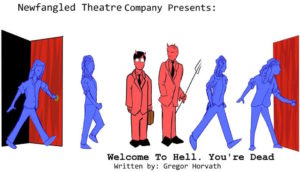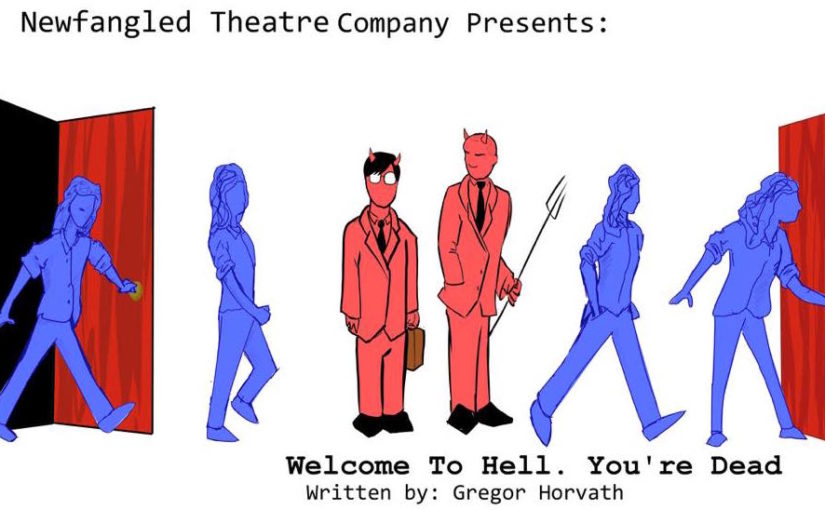
Gregor Horvath’s new play, ‘Welcome to Hell, You’re Dead,’ includes twists and turns that add interest and intrigue to the plotline.
On a Thursday night in the Walsh Studio Theatre, the lights turn off, leaving everyone awash in darkness.
Suddenly, the lights flick back on. Junior Burleigh Holder is sitting in a chair, seemingly waiting for something. Then Hannah Siverston walks through the solitary door parallel to Holder’s position.
Siverston takes in her surroundings. Then Holder exclaims, “Welcome to Hell. You’re dead!”
Thursday was the debut of Newfangled Theatre Company’s full-length production of the year. Newfangled is an entirely student-run, student-produced and student-directed theater company.
Each year, Newfangled hosts two productions. Fall semester is their popular 7/11 project. This spring, their full-length production was a play written by senior Gregor Horvath: “Welcome to Hell, You’re Dead.”
Tony/Jim (Siverston) descends into Hell to find her soul. She believes if she finds her soul, she can make a decision about her own fate back up on earth. The first person Tony/Jim encounters is a meddling demon, Clyde (Holder).
Clyde not only manipulates Tony/Jim, but also the audience. Like a good demon, Clyde’s nature is generally slippery and vile, giving mixed signals about his intentions to the audience.
Along the way, Tony/Jim also encounters B/Bernadette (Hanna Stout), a soul trapped in Hell, being manipulated by Clyde and who also has her own mysterious background. B/Bernadette tries to help Tony/Jim, but her own confusion about her place in Hell and her own motives for searching through Hell.
“Welcome to Hell, You’re Dead” was a fascinating alternative narrative about the nature of Hell. Horvath combined elements of Christian popular ideas of Hell, with Dante’s “Inferno” and an idea of a corporate hierarchy, to make a humorous and relatable idea of what Hell is like.
The idea of torture is also subtly displayed throughout the play. Clyde can be seen taking something from his souls, and afterward, they become confused, open to suggestion.
This is especially apparent in B/Bernadette. While she is trying her best to prevent Tony/Jim from getting stuck in Hell, whenever Clyde comes around, she always becomes confused on her intentions. It is uncomfortable to watch her fear, her love and her confusion at the hands of Clyde.
Perhaps the best part of the play was the second act. Here the focus of the play is less on Tony/Jim and more on what his particular torture is. This is also where B/Bernadette becomes a stronger character, breaking free from Clyde’s manipulations and using his own tricks against him.
When B/Bernadette must make her final decision, whether to leave Hell or stay, the conflict between her and Clyde returns. This also creates an interesting examination of redemption, and whether B/Bernadette belongs in Hell and if she can ever leave.
The twists and turns throughout the play keep the plot moving forward but also keeps the audience’s mind engaged. This made the student-made production very mature and extremely professional.
There were some hiccups along the way: scene changes were sometimes clunky and awkward. They also took a long time, leaving too much space for the audience to become disengaged with the plot. There were also moments when the dialogue was too fast. There wasn’t enough time to process the words and give the audience time to react, creating a monotony in the speech and creating more confusion than necessary.
However, no production is perfect. For an entirely student-made production, Newfangled really showed their finesse for creating, producing and directing a full-length production, making it an entirely entertaining play.
